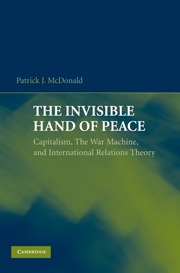Book contents
- Frontmatter
- Contents
- List of Tables
- Acknowledgments
- 1 American Grand Strategy and the Liberal Peace
- 2 Liberal International Relations Theory on War
- 3 Releasing the Invisible Hand
- 4 Liberal Economic Institutions and Peace in the Twentieth Century
- 5 Free Trade and Peace in the First Era of Globalization
- 6 From Rivalry to Friendship
- 7 The Achilles' Heel of Liberal International Relations Theory?
- 8 Peace Across the Taiwan Strait?
- 9 The Invisible Hand or the Ballot Box?
- 10 Capitalism and America's Peaceful Market Power
- References
- Index
5 - Free Trade and Peace in the First Era of Globalization
Published online by Cambridge University Press: 05 June 2012
- Frontmatter
- Contents
- List of Tables
- Acknowledgments
- 1 American Grand Strategy and the Liberal Peace
- 2 Liberal International Relations Theory on War
- 3 Releasing the Invisible Hand
- 4 Liberal Economic Institutions and Peace in the Twentieth Century
- 5 Free Trade and Peace in the First Era of Globalization
- 6 From Rivalry to Friendship
- 7 The Achilles' Heel of Liberal International Relations Theory?
- 8 Peace Across the Taiwan Strait?
- 9 The Invisible Hand or the Ballot Box?
- 10 Capitalism and America's Peaceful Market Power
- References
- Index
Summary
Dating back to Lenin's intellectually and politically transformative pamphlet Imperialism, the fateful summer of 1914 has been used to challenge any connection between capitalism and peace. This challenge has generally centered on the failure of a sustained period of globalization, beginning with the elimination of the Corn Laws in 1846, to prevent the outbreak of World War I. The dramatic war-induced end to this long era of globalization has also been referenced to question the broader foundations of liberal international relations theory, cast doubt on any claim linking trade and peace in the period following World War II, and assert that the contemporary era of globalization possesses an underlying fragility overlooked by those forgetting the lessons of history (Rowe 2005; Ferguson 2005). Those skeptical about the pacific consequences of commerce, such as Realist and Marxist–Leninist scholars, have long relied on this first era of globalization to claim that commerce either heightens military tensions between states or simply has no effect at all on conflict (Lenin 1993[1916]; Waltz 1979; Buzan 1984; Copeland 1996; Ripsman and Blanchard 1996/97; Rowe 1999, 2005; Mearsheimer 2001; Jervis 2002).
Apart from the example of World War I, these criticisms have remained strong for multiple reasons. Few studies systematically examine the links between trade and conflict during this first era of globalization (Mansfield and Pollins 2003, p. 8).
- Type
- Chapter
- Information
- The Invisible Hand of PeaceCapitalism, the War Machine, and International Relations Theory, pp. 111 - 130Publisher: Cambridge University PressPrint publication year: 2009



